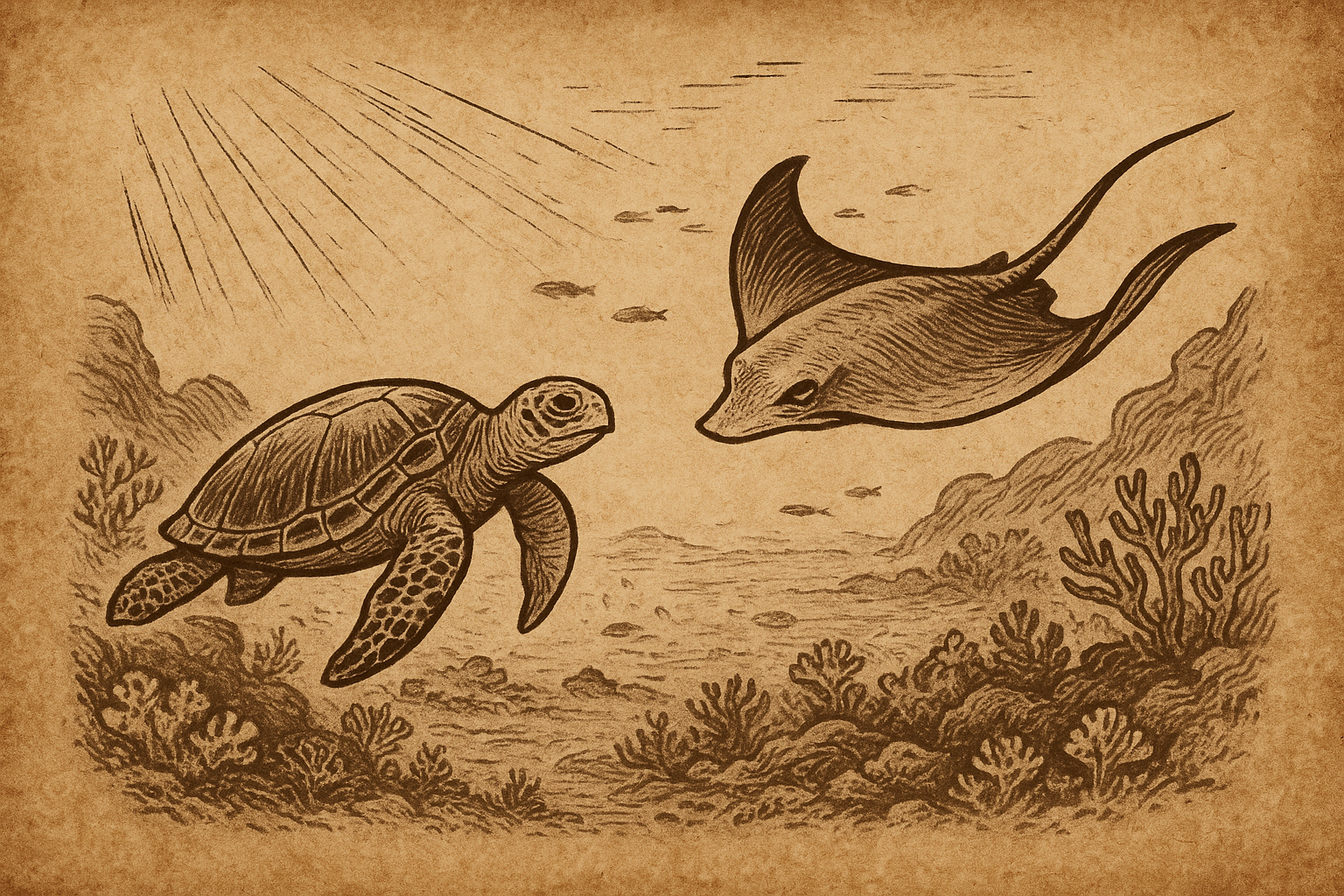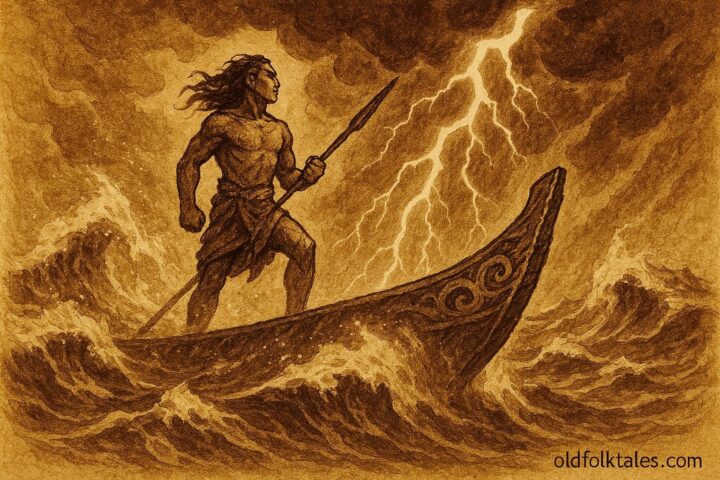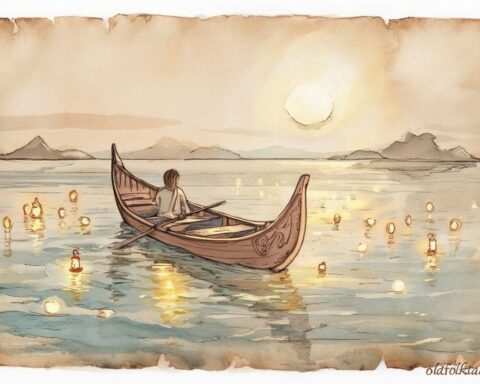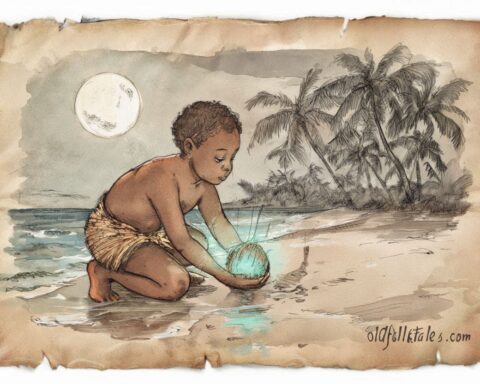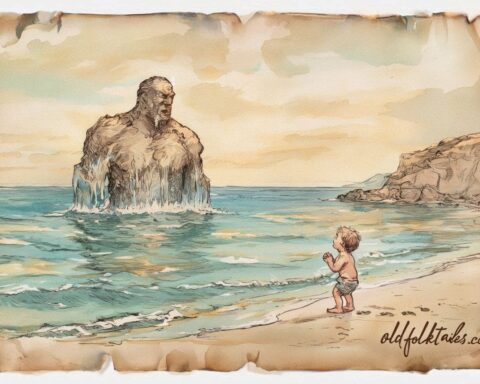In the ancient days when the world was younger and the boundaries between creatures were not as they are now, the sea creatures possessed the gift of speech. They conversed in the language of waves and currents, their voices rising and falling with the tides. In those times, beneath the crystalline waters surrounding the islands of Fiji, where coral gardens bloomed in colors that would shame the sunset and fish darted like living jewels through forests of swaying kelp, there lived two friends who were as different as the moon and the sun.
One was a turtle, his shell worn smooth by countless journeys through the ocean’s embrace, patterned with the wisdom of years and the patience of the tides themselves. His flippers moved with deliberate grace, each stroke measured and purposeful, carrying him through the water with a steadiness that never faltered, never rushed. His eyes held the calm depth of one who knows that all journeys end in their proper time.
Click to read all Melanesian Folktales — rich oral storytelling from Papua New Guinea, Fiji, Solomon Islands, and Vanuatu
The other was a stingray, sleek and elegant, his body a living shadow that rippled across the seafloor like windblown silk. His fins undulated with effortless speed, propelling him through the water with movements so fluid they seemed more dance than swimming. Where the turtle was ancient patience embodied, the stingray was quicksilver energy, always darting, always moving, always seeking the next current to ride.
Despite their differences or perhaps because of them the two had become the closest of companions. They explored the reef together, shared stories beneath the coral overhangs, and watched the great whales pass on their mysterious migrations to distant waters. They had seen many seasons together, many moons rise and fall, and their friendship seemed as permanent as the ocean itself.
But even the deepest friendships can be tested by pride.
One brilliant morning, as sunlight speared down through the surface waters in great golden columns that illuminated the dancing particles of the sea, the two friends found themselves resting near the outer reef. The water was particularly clear that day, and they could see far into the distance where the seafloor dropped away into the mysterious blue depths of the lagoon.
The stingray, feeling particularly energetic as the warm currents caressed his fins, began to speak of his abilities. His voice carried the confident tone of one who has never truly been challenged.
“You know, my friend,” he said, his body undulating gently in place, “I am blessed with remarkable speed. I can cross from reef to reef before the current changes. I can outrace the bonito fish when they hunt. There is perhaps no creature in these waters who can match my swiftness.”
The turtle, who had been peacefully drifting, turned his ancient eyes toward his friend. A small smile seemed to play at the corners of his beak-like mouth.
“Speed is indeed a gift,” the turtle replied, his voice as steady as his swimming, “but I too have been blessed by the sea. My gift is endurance. I may not be swift, but I am steady. I never tire. I never stop. From reef to reef, from island to island, I simply continue. This, too, is a kind of strength.”
The stingray’s fins rippled with amusement. “Endurance? What use is endurance when you are so slow that the tide changes before you reach your destination?”
“What use is speed,” the turtle countered gently, “if you cannot sustain it?”
And so the argument grew, each friend defending his own particular virtue, until finally the stingray, his pride fully awakened, issued a challenge that would change everything.
“Then let us settle this matter once and for all! We shall race from this reef to the deep lagoon beyond. The winner will prove whose way is superior your plodding patience or my magnificent speed!”
The turtle considered this for a long moment, his flippers moving slowly in the current. Then he nodded. “Very well. Let us race. But remember, my friend, that not all contests are won in the way we expect.”
They positioned themselves side by side on the reef’s edge, where the coral dropped away and the water deepened from turquoise to sapphire. A passing school of silver fish agreed to mark the start, and at their signal, both competitors launched themselves toward the distant lagoon.
The stingray exploded forward like an arrow released from a bow. His fins became a blur of motion, his body slicing through the water with breathtaking speed. He shot past coral formations in a flash, scattered schools of startled fish, and left a trail of disturbed water in his wake. He glanced back and saw the turtle far behind, barely visible, moving with his same unhurried, steady stroke.
Laughter bubbled from the stingray’s mouth. This would be easier than he thought! He powered forward, reveling in his speed, in the rush of water across his body, in the certainty of his inevitable victory.
Halfway to the lagoon, something began to change. The stingray’s fins, which had been moving so effortlessly, began to ache. His breath came harder. The muscles that had propelled him so swiftly now burned with the fire of overexertion. He tried to maintain his pace, but his body had other ideas. Slower and slower he moved, until finally he was barely gliding, his chest heaving, his pride wounded as deeply as his exhausted body.
It was then that the turtle passed him.
The ancient creature moved with the same measured, unhurried pace he had maintained since the race began. His flippers rose and fell with mechanical precision, never faster, never slower, each stroke identical to the one before. He didn’t gloat as he passed his friend. He didn’t even look over. He simply continued, as patient and inevitable as the tide itself.
When the stingray finally dragged himself to the edge of the deep lagoon, he found the turtle waiting peacefully, floating in the gentle current as if he had been there for hours rather than moments. The turtle’s expression held no triumph, only the gentle understanding of one who has learned his lessons through long experience.
The stingray, humbled to his very core, could not meet his friend’s eyes. He lowered his head until his fins nearly touched the sandy bottom, bowing in the traditional gesture of respect and acknowledgment.
“You were right,” he said, his voice barely a whisper. “I was a fool, blinded by my own pride. Speed without endurance is meaningless. From this day forward, I will swim beneath the sand to avoid the shame of my arrogance.”
The turtle moved closer, his ancient eyes kind. “And I will always show my back to the sun, rising to the surface to remember this day and the lesson it taught us both. Not my victory over you, dear friend, but the reminder that patience, persistence, and humility are virtues worth more than fleeting speed.”
And from that day to this, the stingrays of Fiji’s waters glide beneath the sand, their flat bodies pressed close to the seafloor, moving with grace but without the arrogant display of their ancestor. And the turtles rise calmly to the surface, their shells catching the sunlight, patient reminders of the wisdom that comes from steady progress and the understanding that the fastest path is not always the wisest one.
Explore tales of ancestral spirits and island creation that connect people to the land and sea
The Moral Lesson
This timeless Fijian fable teaches us that true strength lies not in flashy displays of ability, but in consistent, patient effort and the humility to recognize our limitations. The stingray’s speed, impressive as it was, proved useless without the endurance to sustain it, while the turtle’s steady persistence carried him to victory. The story reminds us that pride often blinds us to our weaknesses and that boasting about our gifts can lead to humiliation. More importantly, it shows us that wisdom comes from knowing ourselves honestly our strengths and our limits and from respecting the different gifts that others possess. The natural behaviors of stingrays and turtles serve as living reminders of these lessons, teaching each generation to value patience over haste and humility over pride.
Knowledge Check
Q1: What special ability did sea creatures have in ancient times according to this Fijian fable?
A1: According to the story, in ancient times sea creatures possessed the gift of speech and could converse with one another in the language of waves and currents. This ability allowed them to share stories, debate, and communicate as the turtle and stingray did when they argued about their respective strengths and ultimately agreed to race.
Q2: What were the main character traits that distinguished the turtle from the stingray?
A2: The turtle embodied patience, endurance, and steady persistence. He moved with deliberate grace and never rushed, representing ancient wisdom and the understanding that all journeys end in their proper time. The stingray, in contrast, represented speed, elegance, and energetic confidence. He was quicksilver fast and effortless in his movements, but this speed came with the weakness of limited endurance and the flaw of pride in his abilities.
Q3: Why did the stingray lose the race despite being faster than the turtle?
A3: The stingray lost because he lacked endurance to sustain his impressive speed. Halfway through the race to the deep lagoon, his muscles burned from overexertion, his breath came hard, and he could no longer maintain his swift pace. His speed was flashy but unsustainable, while the turtle’s steady, measured pace never changed and never tired, allowing him to continue when the stingray was exhausted.
Q4: What do the behaviors of stingrays and turtles symbolize in Fijian culture according to this story?
A4: In this fable, the stingray’s behavior of hiding beneath the sand symbolizes humility learned through the experience of prideful defeat a reminder to avoid arrogance and boastfulness. The turtle’s behavior of rising to the surface with his back to the sun symbolizes patience, persistence, and the wisdom of remembering important lessons. These natural behaviors serve as living reminders to Fijian people about the values of steady progress, humility, and self-awareness.
Q5: What was the turtle’s response when he won the race, and what does this reveal about his character?
A5: When the turtle won, he did not gloat, boast, or celebrate his victory over his friend. He waited peacefully and responded to the stingray’s humiliation with kindness and understanding, emphasizing that the lesson was about wisdom and patience rather than his personal triumph. This reveals that the turtle possessed not only physical endurance but also emotional maturity, compassion, and true wisdom he understood that the real victory was in the lesson learned, not in defeating his friend.
Q6: Where does this fable originate and what is its significance in Fijian oral tradition?
A6: This fable originates from the oral traditions of Fiji’s coastal communities, where relationships with sea creatures have always been central to island life and culture. The story was documented in early 20th-century folklore collections and preserved through the Fiji Museum and cultural education programs. Its significance lies in teaching fundamental values patience, humility, and steady effort through the familiar behaviors of sea creatures that Fijian people encounter daily, making the moral lessons memorable and relevant across generations.
Source: Retold from oral tradition recorded in A. Hocart, “Fijian Stories and Customs,” Folklore Journal (1909); corroborated by Fiji Museum archives and cultural education materials by the Ministry of iTaukei Affairs.
Cultural Origin: Indigenous Fijian oral tradition, coastal communities of Fiji
